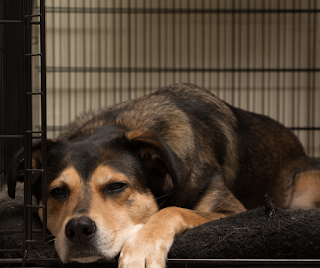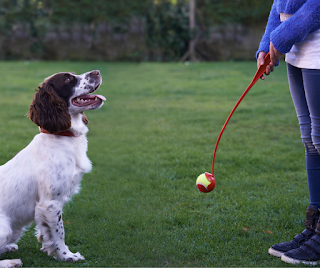5 Useful Tips To Settle In Your Rescued Dog
5 Useful Tips To Settle In Your Rescued Dog
Bringing a rescue dog into your life is an amazing and often hugely rewarding thing to do. However, it is not always without it's challenges. Here are some top tips to help make the settling in process as smooth as possible for you new canine companion;
Space
The moment your rescued dog enters your home, they are surrounded by alien scents, sights and sounds, not to mention people or other animals that they have not encountered before. This is a lot for even a particularly confident dog to comprehend, let alone one who may feel a little bit lost in the world already.Ensuring that your new addition has plenty of space where they feel secure is crucial. Many rescue dogs can be anxious about being in unfamiliar surroundings so by providing them with a safe space, they can explore their new home and family at their own pace. In doing so, this should reduce their stress levels and it takes the pressure off them as they can look around on their own terms and take a step back if it all gets a bit too much for them.
This could be in the form a crate with the door left open, a quiet room of the house where they won't be disturbed or a comfy bed of their own in the corner of your room. Anywhere that is peaceful for them is ideal.
Time
Whilst some rescue dogs may bound into their new home in a whirlwind of excitement, this does not mean that they will always be this confident and adaptable. The same can also be said for those dogs who approach their new home with a little more trepidation, they too are not likely to feel this way indefinitely. In fact, it is thought that the whole process of your new dog settling into their home can take several months, dependant on the dog themselves.A general guide is the 3-3-3 approach which suggests that the first 3 days, your new friend is likely to feel overwhelmed by their new surroundings. After 3 weeks, their true personality will begin to appear and they may begin to test some boundaries, to see what they can and can't do in your care. Then after 3 months, they are likely to be almost totally comfortable around you and settled into their new home with you.
It should be remembered that this is only a general guide and that each dog's history and personality should be carefully considered in each situation. It is important that you do not put too much pressure on your dog to behave in a certain way or fit into your home and lifestyle too quickly, and instead let them go through the process at their own pace.
Calm
It is imperative that not only does your new rescued dog have plenty of opportunities to relax and decompress, but also that you yourself remain calm around them too. Dog's pick up on our mood, body language and social cues, even if they have only just met us so by you being calm, it will help to calm them too.For the vast majority of rescue dogs, their lives have changed dramatically in short spaces of time. Their original owners may have passed away, or they could no longer keep them for a whole host of reasons. Even down to the dogs who have tragically been abused and neglected, they have had a lot of things to deal with in their recent lives. This takes a lot of time to process and heal, so it is important that you are supportive of this and help to maintain calmness for them to do so effectively.
Particularly in the early stages of your rescue dog coming home to you, be mindful that they many not always behave impeccably. They may have accidents in the house, or they may chew your furniture, often simply because they need an outlet for their anxious feelings. So, the last thing they need is any further stress piled onto them when they are already struggling.
Calming activities such as sniffing and chewing are ideal ways to help to keep your dog calm and relaxed. Snuffle mats, long lasting natural chews, food toys and lickmats are all useful tools to try and help here.
No Expectations
By having low or even no expectations of your new dog, this allows them to settle in at their own pace instead of them being forced to fit into your lifestyle straight away. You may want a dog who can join you for a coffee at your local cafe, and this is not to say that this is an unobtainable goal. However, for many rescue dogs, this will simply be far too overwhelming for them in the early stages so they should not be pushed into it just to fulfil our own desires. I personally have a rescue dog that would never be comfortable in a situation like this one, so it is important to accept the dog you have in front of you and not try too hard to shape them into something they will undoubtably choose not to be if it was left to them to decide.Positivity
Forming positive associations for your new rescue dog is crucial. Not only will this help them realise that their new home and lifestyle is something great, but it will also build and strengthen the bond you share with them too.Whilst it is not always an option to start formal training straight away with your new canine companion, you can start low pressure training at their pace. For example, simple exercises such as throwing tasty treats in your garden is a great way to get them to explore their new home without any added pressure. Similarly, these higher value treats can be given to them when they choose to go outside to relieve themselves for example, making them more likely to do so again in the future in return for a reward.
By maintaining a positive, upbeat atmosphere, your new dog is much more likely to be able to settle in effectively as they will see and navigate their new world through positive experiences. What is not to love about that?
You can keep up to date with my latest blogs at Charlotte Garner - Canine Author
To read more about how to strengthen the relationship you share with your dog, why not try Canine Contentment - The Essential Guide








Comments
Post a Comment